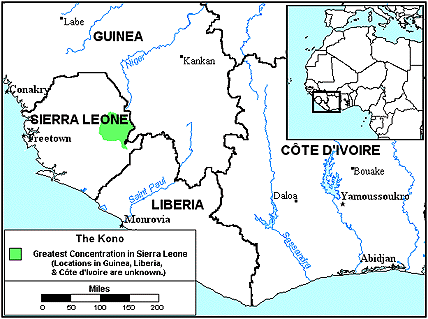|
|
Prayer Profile
The Kono of Cote D'Ivoire
![[IMAGE]](../images3/0537.jpg) The Kono are a Manding-speaking people scattered throughout the countries of Sierra Leone, Guinea, Liberia, and Cote d'Ivoire in West Africa. Today, nearly 14,000 Kono live in Cote d'Ivoire, settled along the main roads in the southwest of the country.
The Kono are a Manding-speaking people scattered throughout the countries of Sierra Leone, Guinea, Liberia, and Cote d'Ivoire in West Africa. Today, nearly 14,000 Kono live in Cote d'Ivoire, settled along the main roads in the southwest of the country.
Kono history claims that the Kono were once a powerful people in Mali and Guinea. Over three hundred years ago, they spread into Sierra Leone as peaceful hunters. Further immigration into the area left the Kono with an over-populated country which had fallow soil.
Attacks from the Mende people forced the Kono to seek refuge in the Koranko country to the north, where they were allowed to farm the land. The Mende eventually moved further south, and the Kono returned to their own land, the soil of which was rejuvenated and fertile. In recent years, the soil once again has become depleted; therefore, some Kono have migrated to Liberia, Guinea, and Cote d'Ivoire.
What Are Their Lives Like
Most Kono are farmers who grow rice, cassava, corn, and beans as their main crops. They live in compact settlements and travel daily to their surrounding farm lands to work. They are a polite and hospitable people and even allow strangers to lodge with them or their chiefs.
The size of rural Kono villages varies from several houses to nearly one hundred dwellings. Kono houses were at one time round constructions made of mud, clay, and thatch. Although some of these houses still exist today, those recently built are rectangular and made of adobe blocks. The rectangular houses have verandas where the women cook and others can enjoy the shade.
After sunset, in the open courtyards of the villages, the entire village sings. The people dance in a single file circle to the beat of drums. Each person develops his own individual steps and movements in an attempt to stand out in the crowd.
The Kono year is divided into a rainy and a dry season. The rainy season is a time for farming. Families leave their homes early in the morning, walk to their farms, and return home at dusk. Cooking, bathing, and other household chores are done at the farms by most of the women, while the men and other women perform the agricultural tasks.
After the rice harvest, the heavy agricultural work is finished, giving way to the dry season. Most people remain in town every day during the dry season since many social events take place at that time of year. During this period, young boys are initiated into the Poro society, and young girls, into the Sande society. These societies teach youth the Kono culture and habits. Training for these organizations bridges the gap between childhood and adult life.
The dry season is also a time when much courting and many marriages take place. A man's wealth is determined by the number of wives he has. Most men have more than one wife, and those men with many wives are shown the greatest respect and honor. Also during the dry season, women organize fishing expeditions and older men may be found outdoors weaving.
What Are Their Belief?
Although many of the Kono in Cote d'Ivoire have converted to Islam, they often practice their traditional religion, as well. For example, Kono worship and pray to dead ancestors. They believe the ancestors are present during every activity, including eating, sleeping, and dancing. The Kono are also superstitious and use curses, omens, charms, and magic in their daily lives.
What Are Their Needs?
The Kono have many needs, including better medical care and transportation. They also need clean water and more educational facilities.
Prayer is a real key to reaching them with the Gospel message. They need additional Christian workers who understand their culture to labor among them and to share the love of Jesus with them.
Prayer Points
- Ask the Lord to send Christian missionaries and laborers into Cote d'Ivoire to work among the Kono.
- Pray that the Kono will begin to hunger for a personal relationship with God.
- Ask God to reveal Himself to the Kono through dreams and visions.
- Pray that God will save key leaders among the Kono who will boldly share the love of Jesus with their own people.
- Pray that Bibles and Christian literature will be available for the Kono in their own language.
- Take authority over the spiritual principalities and powers that are keeping the Kono bound.
- Ask God to raise up prayer teams who will begin breaking up the soil through worship and intercession.
- Pray that strong local churches will be raised up among the Kono.

Statistics
Latest estimates from the World Evangelization Research Center.
THE PEOPLE
- People name: Kono
- Country: Cote D'Ivoire
- Their language: Kono
- Population:
- Largest religion:
- Christian: 5%
- Church members: 910
- Scriptures in their own language: Portions
- Jesus Film in their own language: None
- Christian broadcasts in their own language: None
- Mission agencies working among this people: 0
- Persons who have heard the Gospel: 4,100 (30%)
- Persons who have never heard the Gospel: 9,600 (70%)
THEIR COUNTRY
- Country: Cote D'Ivoire
- Population:
- Major peoples in size order:
- Major religions:
- Number of denominations: 36
© Copyright 1997
Bethany World Prayer Center
This profile may be copied and distributed without obtaining permission
as long as it is not altered, bound, published
or used for profit purposes.
![[HOME BUTTON]](../graphics/home.jpg)
![[CALENDAR BUTTON]](../graphics/calico.jpg)
![[LIST BUTTON]](../graphics/listico.jpg)
[Home]
[Calendar]
[Country List]
|